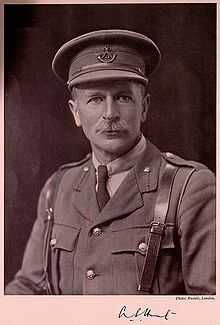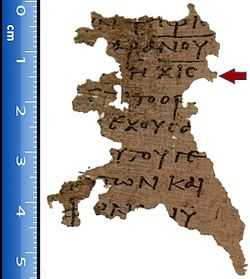Papyrus 115
|
Red arrow points to χιϛ (616), "number of the beast" in P115 | |
| Name | P. Oxy. 4499 |
|---|---|
| Text | Rev 2-3, 5-6, 8-15 |
| Date | c. 275 |
| Found | Oxyrhynchus, Egypt |
| Now at | Ashmolean Museum |
| Cite | Juan Chapa, Oxyrynchus Papyri 66:11-39. (#4499) |
| Size | 26 fragments; 15.5 x 23.5 cm; 33-36 lines/page |
| Type | Alexandrian, close agreement with A & C |
| Category | I |
| Note | Gives number of the beast as 616 |
Papyrus 115 (P. Oxy. 4499, designated by  115 in the Gregory-Aland numbering) is a fragmented manuscript of the New Testament written in Greek on papyrus. It consists of 26 fragments of a codex containing parts of the Book of Revelation, and probably nothing more.[1] It dates to the 3rd century, ca. 225-275 AD.[2] Grenfell and Hunt discovered the papyrus in Oxyrhynchus, Egypt.
115 in the Gregory-Aland numbering) is a fragmented manuscript of the New Testament written in Greek on papyrus. It consists of 26 fragments of a codex containing parts of the Book of Revelation, and probably nothing more.[1] It dates to the 3rd century, ca. 225-275 AD.[2] Grenfell and Hunt discovered the papyrus in Oxyrhynchus, Egypt.
 115 was not deciphered and published until the end of the 20th century. It is currently housed at the Ashmolean Museum.[3]
115 was not deciphered and published until the end of the 20th century. It is currently housed at the Ashmolean Museum.[3]
Description
The original codex had 33-36 lines per page of 15.5 cm by 23.5 cm. The surviving text includes Revelation 2:1-3, 13-15, 27-29; 3:10-12; 5:8-9; 6:5-6; 8:3-8, 11-13; 9:1-5, 7-16, 18-21; 10:1-4, 8-11; 11:1-5, 8-15, 18-19; 12:1-5, 8-10, 12-17; 13:1-3, 6-16, 18; 14:1-3, 5-7, 10-11, 14-15, 18-20; 15:1, 4-7.[1]
The manuscript has evidence of the following nomina sacra: ΙΗΛ , ΑΥΤΟΥ , ΠΡΣ , ΘΩ , ΘΥ , ΑΝΩΝ , ΠΝΑ , ΟΥΝΟΥ , ΟΥΝΟΝ , ΚΥ , ΘΝ , ΑΝΟΥ , ΟΥΝΩ.
The manuscript uses the Greek Numeral system, with no number extant as being written out in full.[1]
The manuscript is a witness to the Alexandrian text-type, following the text of Codex Alexandrinus (A) and Codex Ephraemi Rescriptus (C).[4]
An interesting textual variant of  115 is that it gives the number of the beast in Revelation 13:18 as 616 (chi, iota, sigma (ΧΙϚ)), rather than the majority reading of 666 (chi, xi, sigma (ΧΞϚ)), as does Codex Ephraemi Rescriptus.
115 is that it gives the number of the beast in Revelation 13:18 as 616 (chi, iota, sigma (ΧΙϚ)), rather than the majority reading of 666 (chi, xi, sigma (ΧΞϚ)), as does Codex Ephraemi Rescriptus.
According to the transcription of the INTF, the manuscript would've read [χξϛ] η χιϛ (666 or 616), therefore not giving a definite number.[5]
Textual Variants[6]
8:12
9:11
- Include ο before απολλυων:
 115, 1740.
115, 1740. - Omit ο before απολλυων:
 47, א, pc, gig, 2344.
47, א, pc, gig, 2344.
9:13
- Include δ/τεσσάρων:
 115,
115,  , vgcl, syph.
, vgcl, syph. - Omit δ/τεσσάρων:
 47, א, A, 0207, 1611, 2053, 2344, pc, lat, syh, co.
47, א, A, 0207, 1611, 2053, 2344, pc, lat, syh, co.
11:15
12:3
- πυρρος μεγας:
 47,
47,  115, 2053, א.
115, 2053, א. - μεγας πυρρος: A, P, 051, 1841, pm, lat, sa.
- πυρος μεγας: C, 046, 1611, 1854, 2329, 2344, pm, syh.
13:8
- το ονομα αυτου: C 1854, 2053, pc, Irlat, Prim.
- το ονομα:
 115,
115,  , co, Bea.
, co, Bea. - τα ονοματα αυτων :
 47, א, P, 051, 1006, 1841, 2329, al, lat.
47, א, P, 051, 1006, 1841, 2329, al, lat.
13:13
14:6
14:20
- βχ (2600):
 115.
115. - αχ / χιλιων εξακοσιων (1600):
 47, אc2, A, 42, 69, 82, 93, 177, 325, 456, 498, 627, 699, 1849, 2138, 2329,
47, אc2, A, 42, 69, 82, 93, 177, 325, 456, 498, 627, 699, 1849, 2138, 2329,  .
.
See also
- List of New Testament papyri
- Oxyrhynchus papyri
- Stigma (letter)
References
- ↑ 1.0 1.1 1.2 Comfort, Philip W.; David P. Barrett (2001). The Text of the Earliest New Testament Greek Manuscripts. Wheaton, Illinois: Tyndale House Publishers. pp. 664–677. ISBN 978-0-8423-5265-9.
- ↑ Juan Chapa, Oxy. Pap., 66:11-39, no. 4499
- ↑ "Liste Handschriften". Münster: Institute for New Testament Textual Research. Retrieved 27 August 2011.
- ↑ Philip W. Comfort, Encountering the Manuscripts. An Introduction to New Testament Paleography & Textual Criticism, Nashville, Tennessee: Broadman & Holman Publishers, 2005, p. 77.
- ↑ http://ntvmr.uni-muenster.de/manuscript-workspace/?docID=10115&pageID=160
- ↑ Taken from NA27 Edition Apparatus, and http://ntvmr.uni-muenster.de/nt-transcripts
Further reading
- Juan Chapa, Oxyrynchus Papyri 66:11-39. (no. 4499).
- Philip W. Comfort and David P. Barrett, The Text of the Earliest New Testament Greek Manuscripts, (Wheaton, Illinois: Tyndale House Publishers, 2001), pp. 664–677.
- David C. Parker, A new Oxyrhynchus Papyrus of Revelation: P115 (P. Oxy. 4499), in: Manuscripts, Texts, Theology: Collected Papers, 1977-2007, Walter de Gruyter, Berlin, 2009, pp. 73–92.
External links
- Oxford University 'P. Oxy. LXVI 4499'
- Image of the fragments of P. Oxy. LXVI 4499
 |
 | |
| Arthur Hunt |
